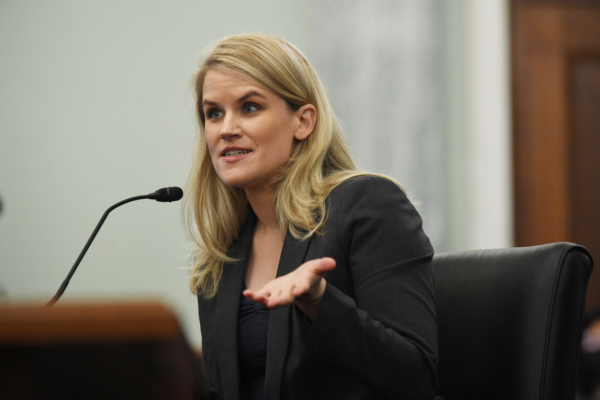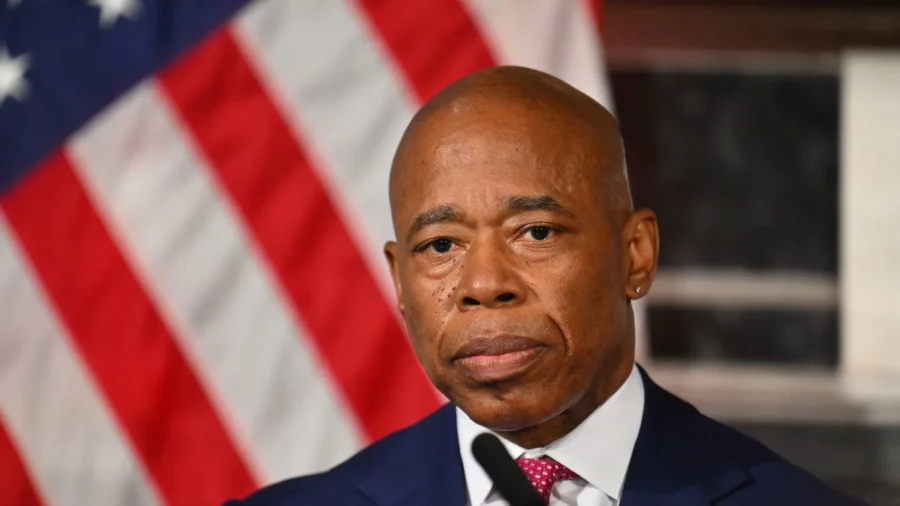New York Mayor Eric Adams filed litigation against major social media platforms, accusing them of negatively impacting young people’s mental health.
Mr. Adams announced the move Wednesday, saying that social media platforms such as Facebook, TikTok, Instagram, and YouTube have only one goal: to make the user stay online as long as possible to have larger profits, which is something young people cannot handle.
“Over the past decade, we have seen just how addictive and overwhelming the online world can be, exposing our children to a non-stop stream of harmful content and fuelling our national youth mental health crisis,” Mr. Adams said in a statement.
He said that young people in New York spend an average of three hours per day in front of a screen, mainly on the major social media platforms.
These platforms capitalize on the dopamine released from likes, trophies, and other digital awards the viewers can give to the video creators, often making young people addicted to this loop. Young people are more easily addicted to that because of their natural urge for play and exploration, according to Mr. Adams.
He added that young people do not talk to each other during lunch in the cafeteria, or they stay inside using social media instead of going out to play, even on a sunny day. Instead of learning confidence and resilience, young people often find themselves feeling insecure and harmed by content they are not ready to see, the mayor said.
Children who start watching an online video for a school assignment “often find that algorithms keep playing other videos, potentially taking them down a rabbit hole that is inappropriate, hateful, and even dangerous,” Mr. Adams said.
Even though there is a positive loop of educational material online, there is a “24/7 digital dystopia that even very young children can easily access without parents or caregivers ever being aware,” he added.
The lawsuit, filed in the California Superior Court, includes Meta’s Facebook and Instagram, Alphabet’s YouTube, Snap Inc.’s Snapchat, and ByteDance’s TikTok and alleges that the companies designed their platforms to “purposefully manipulate and addict children and teens to social media applications.”
Mr. Adams mentioned that the digital world is also troubling to students’ educational growth, with teachers being burned out with students’ phone use in school. Online bullying and radicalization of youth are also apparent, with students even saying online that Osama bin Laden was right, the mayor said.
“This is why New York City is joining hundreds of school districts from across the country and filing this litigation, to protect our children,” he added in his statement.
Facts
The mayor mentioned that according to Frances Haugen’s—a Facebook whistleblower’s—testimony, Instagram knew that 32 percent of teenage girls felt bad about their bodies because of the platform’s content, with some even feeling gross.
Facebook owned Instagram, and now both companies are owned by Meta Inc.

In TikTok, internal documents revealed that 20 percent of children use the application between midnight and 5 a.m., according to the mayor.
There was a 40 percent increase in high school students reporting persistent sadness and hopelessness, emergency room visits for anxiety are up 117 percent, and nationwide suicide rates are up 57 percent.
“These are not just numbers, these are our children, and this is not a reality we can accept or normalize,” Mr. Adams said at the Feb. 14 press conference. “We are facing a serious youth mental health crisis, and it is up to us, as parents, as a city, and as a society, to take action in order not to just educate but ‘to save lives,'” the mayor said, adding, “if we don’t stand up to [these] powerful companies on behalf of our young people, who will?”
Characteristics of Social Media Targeted in the Lawsuit
The mayor’s office outlined the major negative characteristics targeted in the city’s lawsuit.
They are: “Using algorithms to generate feeds that keep users on the platforms longer and encourage compulsive use.”
Using mechanisms “akin to gambling” in their apps, “which allow for anticipation and craving for ‘likes’ and ‘hearts,’ and also provides continuous, personalized streams of content and advertisements.”
Finally, “manipulating users through reciprocity—a social force, especially powerful among teenagers, that describes how people feel compelled to respond to one positive action with another positive action.
“These platforms take advantage of reciprocity by, for example, automatically telling the sender when their message was seen or sending notifications when a message was delivered, encouraging teens to return to the platform again and again.”
Social Media’s Response
Meta, TikTok, and YouTube have already faced hundreds of lawsuits filed on behalf of children and school districts over the addictiveness of social media.
Social media companies have come under intense scrutiny as regulators push them to protect children from harmful content.
Meta, YouTube, TikTok, and Snapchat did not immediately respond to NTD’s requests for comment.
Meta CEO Mark Zuckerberg apologized to families last month at a U.S. Senate hearing about social media’s impact on children.
A Meta spokesperson said to Reuters that the company wanted teens to have “safe, age-appropriate experiences online,” while TikTok said it will continue to work to keep the community safe by tackling industry-wide challenges.
Reuters contributed to this report.

